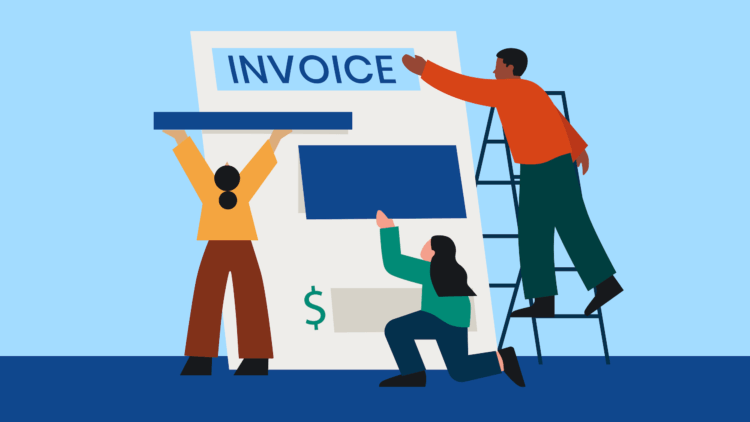The Necessity of Invoices in Today’s Business Landscape
In today’s fast-paced and digitized economy, the need for well-structured invoicing cannot be overstated. Invoices are more than just formal requests for payment; they are records of transactions, proof of agreements, and tools for financial planning.
Legal and Tax Compliance: In many jurisdictions, issuing proper invoices is a legal requirement. They provide documented evidence of income, which is essential for tax filing and audits.
Professionalism and Trust: Sending a professional invoice shows clients that you take your business seriously, reinforcing your credibility.
Cash Flow Management: Invoices create a clear timeline for payments, helping you track revenue and manage expenses effectively.
Without invoices, businesses risk losing track of earnings, facing disputes with clients, or struggling with delayed payments—all of which can spell trouble for small enterprises.
How Small Business Invoices Are Created
Crafting an invoice might sound straightforward, but ensuring it’s both comprehensive and professional takes some thought. Here’s what a small business invoice typically includes:
- Your Business Details: Include your name, logo, address, and contact information.
- Client Details: Clearly state the client’s name, company, and contact information.
- Invoice Number: Assign a unique identifier for tracking purposes.
- Dates: Include both the issue date and payment due date.
- Itemized List: Break down the services or products provided, their quantities, rates, and total cost.
- Payment Terms: Specify acceptable payment methods, late fees, and any relevant policies.
- Final Total: Highlight the amount due, including taxes if applicable.
Today’s digital tools make creating invoices easier than ever. From customizable templates to specialized invoicing software, businesses can generate, send, and even automate invoices in minutes.
Exploring Invoices Tailored to Your Industry
Different industries require tailored invoicing methods to meet their unique needs. Here’s a look at how invoices vary across sectors:
- Freelancers and Creatives: These invoices often include detailed descriptions of projects, hourly rates, and milestone payments.
- Retail and E-commerce: These invoices typically highlight product details, shipping costs, and return policies.
- Construction and Trades: These invoices may involve progress billing, listing completed work and materials used.
- Professional Services: Lawyers, consultants, and other professionals often require invoices with retainer fees, itemized tasks, and hourly rates.
- Healthcare: Medical billing involves codes for treatments, insurance details, and co-pay amounts.
Tailoring invoices to suit industry-specific requirements ensures clarity and professionalism, reducing confusion and disputes.
Invoice Formats: Which One Fits Your Business?
Choosing the perfect invoice format goes beyond personal taste—it’s a strategic move that boosts efficiency, showcases professionalism, and aligns with your clients’ expectations. The right format not only ensures your invoices are easy to understand but also reinforces your brand identity and streamlines payments. Let’s explore some of the most popular options and how they can work for your business.
- PDF Invoices: Ideal for maintaining consistent formatting and providing a professional appearance. They are also easily printable and shareable.
- Excel or Spreadsheet Invoices: Great for businesses needing automated calculations, such as taxes and totals.
- Word Templates: Suitable for simple invoices with minimal calculations.
- Cloud-Based Invoices: Tools like Zintego or Vantazo allow real-time access, updates, and tracking.
- Mobile App Invoices: Perfect for on-the-go entrepreneurs who need to send invoices from their phones.
Choosing the right format depends on your business size, industry, and how often you issue invoices.
How Invoices Simplify Life for Small Business Owners
Invoices are more than just a way to request payment—they’re a lifeline for keeping your business organized and thriving. A well-structured invoicing system not only ensures smooth financial operations but also saves time and reduces stress. Here’s how invoices can make life significantly easier for small business owners:
- Improved Organization: Proper invoicing creates a clear record of all transactions, making bookkeeping and tax preparation seamless.
- Fewer Payment Delays: Clearly stated terms and due dates encourage clients to pay on time.
- Automated Processes: Digital invoicing tools can automate reminders, track payments, and even generate recurring invoices for regular clients.
- Stronger Client Relationships: Professional invoices foster trust and show clients that you value their business.
By streamlining billing, invoices free up time and mental space for what truly matters—growing the business.
The Role of Technology in Modern Invoicing
Gone are the days of manual invoicing—technology has made billing faster, smarter, and more effective. With advanced features that improve accuracy, strengthen client communication, and simplify payments, today’s tools are revolutionizing how small businesses handle their finances. Let’s explore how they’re changing the game:
- Accept online payments directly from invoices: Make it easy for clients to pay instantly, increasing the chances of on-time payments and boosting your cash flow. Convenient payment links embedded in invoices also enhance the client experience.
- Track payment statuses in real-time: Get instant updates on payment activity, enabling you to act quickly on overdue accounts. This visibility ensures you stay organized and maintain healthy cash flow.
- Customize templates with branding elements: Personalize your invoices with your logo, colors, and fonts to create a lasting impression. A consistent and professional design strengthens your brand identity with every client interaction.
- Automate reminders and recurring payments: Save time and avoid awkward payment follow-ups with automated reminders for overdue invoices. Set up recurring payments for subscription services or regular clients to keep your revenue consistent and hassle-free.
Such advancements make invoicing not only easier but also a powerful tool for enhancing financial management.
Additional Tips for Effective Invoicing
A well-crafted invoicing process can do wonders for your business, but there’s always room for improvement. By adopting smart strategies, you can make your invoicing system even more efficient and client-friendly.
To maximize the benefits of your invoicing system, keep these tips in mind:
- Send Invoices Promptly: Don’t wait to bill clients. The sooner you send invoices, the sooner you’re likely to get paid.
- Be Clear and Concise: Avoid jargon and ensure that all details are straightforward and easy to understand.
- Follow Up on Late Payments: Set reminders to follow up on overdue invoices professionally.
- Keep a Record of Everything: Maintain detailed records of all issued invoices and payments received for future reference.
Wrap-up: Why Every Small Business Needs a Strong Invoicing System
Small business invoicing is more than just a routine task; it’s a cornerstone of successful financial management. With the right approach, tools, and attention to detail, invoices can help businesses get paid faster, stay organized, and leave a lasting impression on clients.
Whether you’re a freelancer, retailer, or tradesperson, embracing efficient invoicing practices is a step toward smoother operations and greater success. So, choose the right template, customize it to reflect your brand, and let your invoices work as hard as you do.



